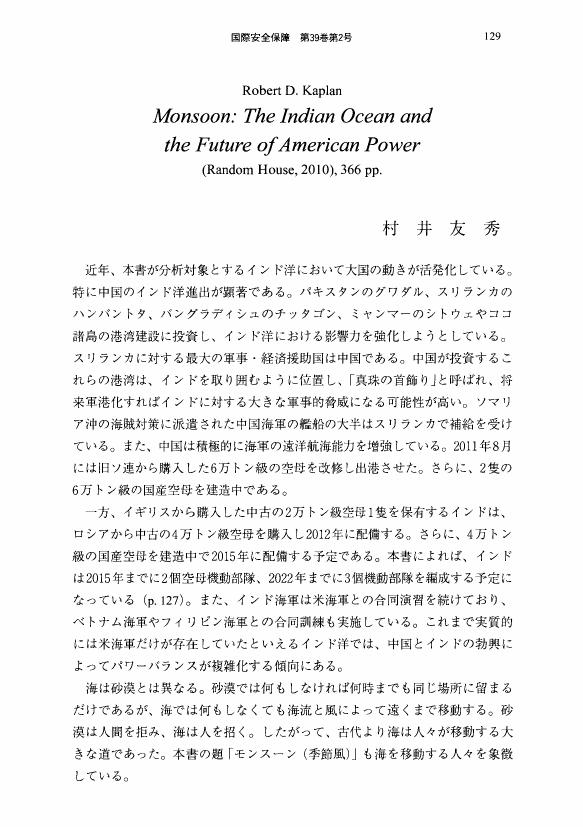8 0 0 0 OA 中国の武器輸出と国家戦略
- 著者
- 村井 友秀
- 出版者
- 財団法人 日本国際政治学会
- 雑誌
- 国際政治 (ISSN:04542215)
- 巻号頁・発行日
- vol.1995, no.108, pp.55-68,L9, 1995-03-20 (Released:2010-09-01)
- 参考文献数
- 77
In many developing countries, the arms industry is the most advanced sector of all industries, and that has raised the technical level and productivity of civil industries. For those reasons, many countries in the Third World have developed arms industries. Now, India, Korea and Sountheast Asian countries are expanding their arms industries.Recently, China has emerged as a major arms exporter to the Third World. In the time of Mao Zedong, China exported small weapons to socialist countries and revolutionary forces by its “friendly price.” But after Deng Xiaoping's reforms, national interest took precedence over ideology, and china began to export large and expensive weapons. For example, China exported tactical ballistic missiles to Syria and Pakistan, and China exported nuclear reactors to Algeria. In 1985, China exported fifty medium-range ballistic missiles to Saudi Arabia for two billion dollars. Saudi Arabia is an anti-communist and fundamental Islamic country.In 1980's, the objective of arms export was to earn foreignn currency for the “Four Modernizations” Programme. China also sold weapons to both Iran and Iraq. At that time they fought a long war of attrition.Chinese weapons are competitive in the world arms market. They are basically copies of Soviet weapons of 1950's and 60's. China insists that Chinese weapons are cheap, tough and easy to handle. But complicated weapons, such as tanks and fighters, are said to have many defects. Nevertheless, for developing countries, cheap Chinese weapons are very attractive.Chinese weapons cannot fight against the high-tech weapons of the advanced countries. But Chinese weapons can fight well against the old weapons of the developing countries. Above all, developing countries can import Chinese weapons in a short period of time. In many advanced countries, arms exports are strictly controlled by the government. Technical procedure of arms exporting has to take lengthy steps, and sometimes it takes a few years. But in China, there is no congress or mass media which can check the Communist Party. For those countries, that may cause political or economic frictions with the advanced countries, China is a convenient country, or the only choice to deal with. Chinese low price weapons, which are easy to import, lower the threshold of war.China influences the devloping countries not by economic aid but by arms export. Looking back over the Cold War era, one of the most powerful resources of the superpowers was their superior military capability which enabled them to control the world arms market. China's national strategy is to be the hegemon in East Asia and to have influence over the world. China's active arms export strengthens the Chinese influence upon the Third World, and advances its national strategy.
- 著者
- 村井 友秀
- 出版者
- 国際安全保障学会
- 雑誌
- 国際安全保障 (ISSN:13467573)
- 巻号頁・発行日
- vol.43, no.1, pp.133-137, 2015-06-30 (Released:2022-04-01)
- 著者
- 村井 友秀
- 出版者
- 国際安全保障学会
- 雑誌
- 国際安全保障 (ISSN:13467573)
- 巻号頁・発行日
- vol.39, no.2, pp.129-132, 2011-09-30 (Released:2022-04-14)
- 著者
- 村井 友秀
- 出版者
- 国際安全保障学会
- 雑誌
- 国際安全保障 (ISSN:13467573)
- 巻号頁・発行日
- vol.32, no.3, pp.143-146, 2004-12-31 (Released:2022-04-24)
- 著者
- 村井 友秀
- 出版者
- 国際安全保障学会
- 雑誌
- 国際安全保障 (ISSN:13467573)
- 巻号頁・発行日
- vol.39, no.2, pp.129-132, 2011-09


